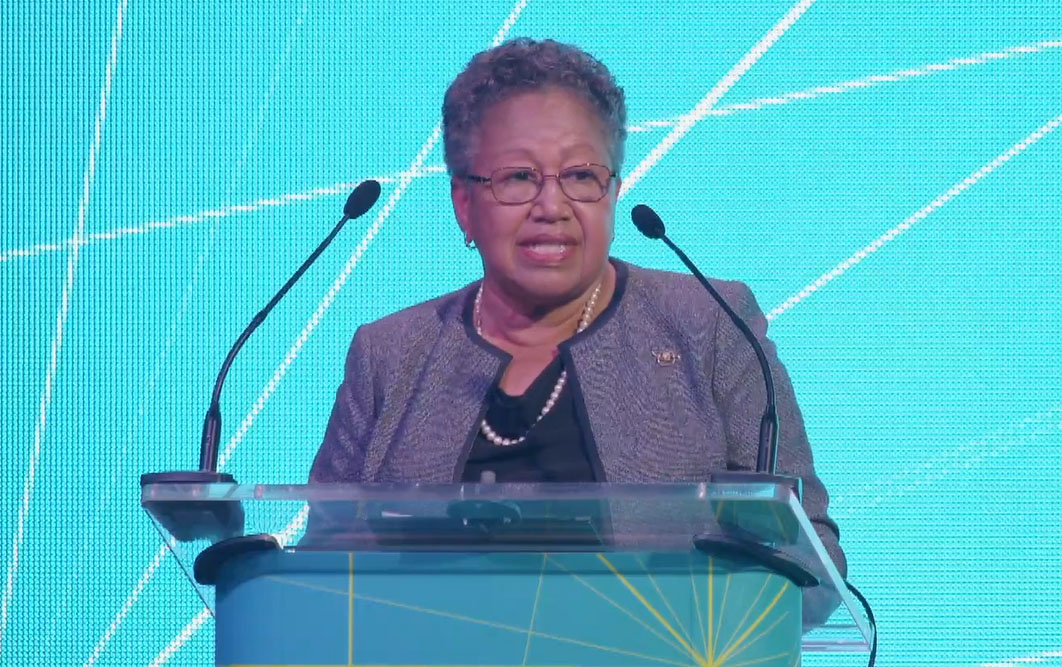Even as she sounded a distinct note of optimism in the matter of the push to further cement trade and deeper business ties between Africa and the Caribbean, Caribbean Community (CARICOM) Secretary General Dr. Carla Barnett last Friday told the Second Afri-Caribbean Trade and Investment Forum (ACTIF) in Barbados that the task of actualizing the envisaged linkages between the two regions will not be “an easy one.”
Pointing out that trade relations between CARICOM and Africa “are slowly emerging from the patterns that were embedded in our colonial arrangements’ and which have “carried over into our post-colonial economic realities,” Dr. Barnett said that if the ambitions of ACTIF are to be realized “we must reset these systems and foster real South-South cooperation.”

Dr. Barnett told the gathering that long prior to the current push for the strengthening of trade and business ties, nations in the Caribbean and Africa had “cooperated at the political level through the struggles of decolonization and independence, and through the anti-apartheid struggle.” It is this political cooperation, she said, that “has laid a foundation on which we can and must build a new trade and economic partnership that promotes mutual development and prosperity.”
Noting that relationships between the Caribbean and Africa were “slowly emerging from the patterns that were embedded in our colonial arrangements” and that those relationships had “carried over into our post-colonial economic realities, Dr. Barnett said that she saw last week’s Barbados forum as an “important first step towards building bilateral cooperation between the Caribbean and Africa and promoting trade, investment, technology transfer, innovation, tourism, culture, and other services.” The potential to do business together, she added, is “tremendous.”
In probing that potential Dr. Barnett noted that the prospects for enhancing Caribbean/Africa trade relations were even more promising giving the work that was already underway in the region to reduce its non-tariff barriers, particularly in agriculture. Further, she noted that the region was continuing to work towards the strengthening of productivity and overall trade performance with a view to securing the transformation of its agricultural and industrial sectors.
Meanwhile, Dr. Barnett told the forum that the Caribbean’s recently disclosed 25×2025 plan which targets the reduction of extra regional food imports by 2025 was already gaining momentum and that the pursuit of this goal was being supported by “decisive actions to address trade barriers and promote productivity across the Region.”
In expressing optimism with regard to the portents for the realization of successful partnerships between the Caribbean and Africa she noted that the region had already embarked on an industrial policy which she said would “complement the positive steps underway in agriculture.” This, she stated, would add to the fact that the Caribbean had already become “a strong performer, especially in sectors such as travel, tourism, and financial services,” a circumstance that had given rise to “real opportunities for investment and trade across those areas.”
In probing some of the statistical considerations that had attended trading ties between the Caribbean and Africa Dr. Barnett noted that while, in 2018, CARICOM’s overall exports to the world amounted to US$18.6 billion, total exports to Africa amounted to just US$815.00 or 4.4 per cent of the region’s overall exports. “In that same year, CARICOM’s imports from the world stood at 33 billion US dollars, with imports from Africa of only US$603 million dollars. Africa therefore accounted for approximately only 2 per cent of our total trade,” she added. That volume of trade between Africa and the Caribbean which Dr. Barnett said had declined even further with the advent of the COVID-19 pandemic had begun to assume an upward trajectory to $US538 million with the top exports to Africa including anhydrous ammonia, alumina, oil drilling tubing and material, sauces and condiments, frozen orange juice concentrate, with Morocco, Ghana and South Africa being the main importers from CARICOM. Simultaneously, according to Dr. Barnett the top ten imports from Africa included liquid natural gas, vehicles, barium sulphate, bitumen and coriander seeds, “with the main sources being Nigeria, South Africa and Morocco.” There exists, the CARICOM Secretary General told the Barbados forum, “tremendous opportunity for expansion and deepening of trading relations” between the Caribbean and Africa.
If, however, trade and investment flows between the Caribbean and Africa is to be further enhanced, Dr. Barnett told the gathering, there was need to strengthen and streamline “the supporting infrastructure including air and maritime distribution and transportation channels and that this required, among other things, a move to establish a Multilateral Air Services Agreement between African countries and the Community.”
Beyond the prospects for the strengthening of economic and trade relations between the Caribbean and Africa Dr. Barnett noted that the opportunities promised even wider “gateway” through the preferential agreements which the region enjoys “with several Latin American and Caribbean neighbors, as well as others” and which “provide significant market access opportunities for investors producing within CARICOM for those markets that represent a combined 11 trillion US dollars in imports of goods and services at this time.”






